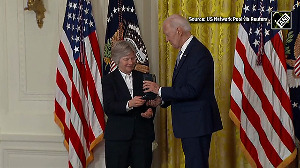No political party, if it can avoid it, will choose to lose the votes of members of the unions and their families, says T C A Srinivasa-Raghavan.
 The Narendra Modi government, in its bid to speed up industrialisation, has come up against yet more resistance, this time from labour and its trades unions.
The Narendra Modi government, in its bid to speed up industrialisation, has come up against yet more resistance, this time from labour and its trades unions.
On September 2, a few million members of these unions went on a strike protesting against the reform of Chapter 5B of the Industrial Disputes Act and the Contract Labour Act.
This is probably only the beginning because the unions have seen that when the going gets really tough, Narendra Modi retreats.
They will, naturally, resist any diminution in their entitlements of which the most important is the type of establishments to which the Industrial Disputes Act applies.
The government is trying to reduce their number. The unions always rile economists more than anyone else. Rigidities in the labour markets hold industrial investment back, they say.
They have been saying the same thing for several decades now.
It has become very boring now.
Thus, about six years ago, the deputy chairman of the Planning Commission invited a handful of people to listen to a presentation on labour laws by two young NRI economists.
Both have gone on to become important in the policy-making apparatus since then. The central point of the presentation was along expected lines.
They called India's labour laws "idiosyncratic" and demanded that the laws be changed. I asked them if they had read the Constitution, the Trades Union Act and the Industrial Disputes Act.
They said no. So there was no point in asking them which bits they thought needed reform. I had to be content with rolling my light brown eyes.
The Holy Grail About a year later, another NRI economist who has also become very important now - in form at least if not substance - made the same point at NCAER. He was very nearly frothing at the mouth at the entitlements Indian labour enjoyed.
I asked him if he had read the Constitution, the Trades Union Act and the Industrial Disputes Act.
He said yes. So tell me, which bits you think need reform, I said. He snarled back that it was people like me who were holding back reforms while people like him were fighting in the trenches for it.
He claimed he knew the ID Act backwards. Regrettably he didn't make a similar claim about the Constitution and the Trades Union Act, which is mostly about procedure.
Then, two years ago, at another meeting organised by some other forum, the former deputy chairman himself said much the same thing.
But he said it gently, obliquely and without the angry emphasis that some NRI economists feel they must sport when they speak to Indian audience.
I didn't need to ask him if he had read the Constitution, the Trades Union Act and the Industrial Disputes Act. Of course he had.
Nevertheless he was happy to repeat what has now become conventional wisdom that labour laws badly needed to be reformed.
I did, however, ask him which bits needed reform. Had he written his answer in an exam paper, he would have got 33 per cent because that's how much he got right.
He showed no signs that he knew about the other 66 per cent.
So let me explain what this other two-thirds comprise. This is important because the issue of labour law reform is not primarily economic, as economists like to believe. It is entirely political and even, in a way, philosophical.
The political aspect is clear to everyone: votes.
No political party, if it can avoid it, will choose to lose the votes of members of the unions and their families.
Two chief ministers in the past 20 years have bitten the dust when they tried to discipline government employees. One was in Himachal Pradesh in the mid-1990s.
The other was in Tamil Nadu a decade ago. Structural flaw?
The philosophical aspect is more complex in that it has to do with Constitutional rights. Article 19(1)(C) of the Constitution has made the right to form unions a fundamental right.
Hence, we have the Trades Union Act, which lays down the procedures for forming and operating unions.
In order to form a union, however, you need a leader. All leaders promise more entitlements to their members.
But by definition an entitlement comes at someone else's cost, in this case the employers. This leads to disputes.
Hence the Industrial Disputes Act. But then come three huge contradictions.
One is that many mainstream political parties take money from the capitalist employers only to go and expand labour's entitlements.
The second is that after winning an election the politicians come under pressure from their benefactors to abridge 19(1)(C) - which they can't because it is a fundamental right.
The third is the result of the first two: governments find themselves expanding the entitlements of the least productive - farmers and bureaucrats - and abridging those of the more productive parts of the workforce, industrial labour.
All of this happens because of Article 19(1)(C). If you want it to go, and have the courage, say so. If not, shut up and put up.










 © 2025 Rediff.com -
© 2025 Rediff.com -